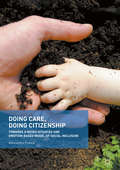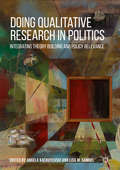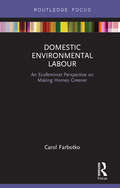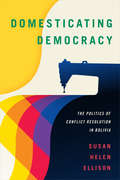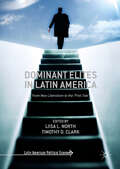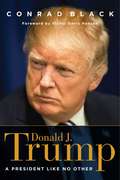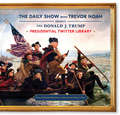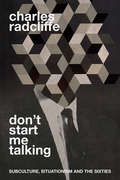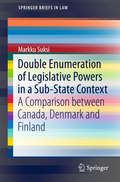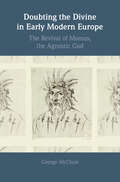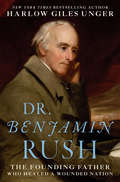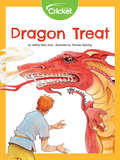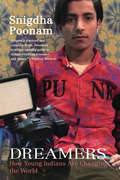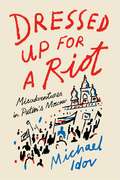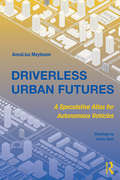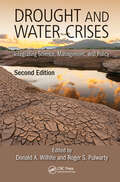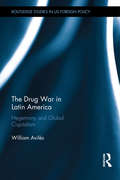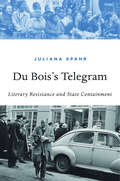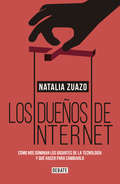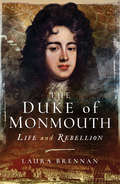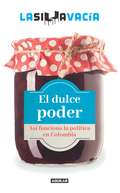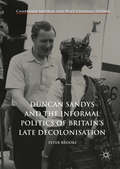- Table View
- List View
Doing Care, Doing Citizenship
by Alessandro PratesiThis book examines the emotional, micro-situated dynamics of status inclusion/exclusion that people produce while caring for others by focusing, in particular, on non-conventional families. Grounded in empirical research that involves different types of care and family contexts, the book situates care within more inclusive and critical approaches while shedding light on its multiple and often overlooked meanings and implications. Engaging and accompanied by a useful methodological appendix, Doing Care, Doing Citizenship is essential reading for students and academics of sociology, psychology, social work and social theory. It will also be of interest to practitioners interested in developing their understanding of the relationship between care, emotions, social inclusion and citizenship.
Doing Qualitative Research in Politics: Integrating Theory Building And Policy Relevance
by Lisa M. Samuel Angela KachuyevskiThis volume offers unique perspectives on how to engage in methods of inquiry in Political Science. Applying the debate in the field over the validity of qualitative methods, the authors illustrate how various methodological approaches are both rigorous and empirically rich. Each of the chapters consists of a particular methodological approach that offers useful insight into pressing political problems important for policy and for theory building. Drawing upon both positivist and interpretive approaches, the chapters illustrate how to engage in qualitative research involving case studies, content analysis and ethnography, each outlining the “doing” part of research. The volume is theoretically, thematically and geographically diverse, important for students and scholars across the field.
Domestic Environmental Labour: An Ecofeminist Perspective on Making Homes Greener (Routledge Explorations in Environmental Studies)
by Carol FarbotkoThis book addresses the question of domestic environmental labour from an ecofeminist perspective. A work of cultural geography, it explores the proposition that the practice and politics of domestic labour being undertaken in the name of ‘the environment’ needs to be better recognized, understood and accounted for as a phenomenon shaped by, and shaping of, gender, class and spatial relations. The book argues that a significant yet neglected phenomenon worthy of research attention is the upsurge in voluntary, and yet mostly unrecognized, domestic environmental labour in high-consuming households in late modernity, with the burden often falling on women seeking to green their lives and homes in aid of a sustainable planet. Further, because domestic environmental labour is undervalued in governance and the formal economy, much like other types of domestic labour, householders have become an unrecognized and unaccounted-for supply of labour for the greening of capitalism. Situated within broad global debates on links between ecological and social change, the book has relevance in the many jurisdictions around the world in which households are positioned as sites of environmental protection through green consumption. The volume engages existing interest in household environmental behaviour and practice, advancing understanding of these topics in new ways.
Domestic Spaces in Post-Mao China: On Electronic Household Appliances (Postcolonial Politics)
by Wang Min’anUnconventional, creative, and highly original, Wang Min’an’s work centres on the assemblage of household machines that create the space of contemporary domesticity. It offers pathways to a new understanding of how the sudden commodification of domestic space in China beginning in the late 1980s has transformed Chinese domestic life beyond recognition. In terms of modern urban Chinese family life, people do not just move into new apartments; they move into new modes of living which involve new ways of relating to the world. Wang’s discussion on the reconstitution of Chinese domestic life—its founding moral, aesthetic, political values—is tremendously useful and enlightening. In these essays, the author stages a Latourian collapse of subject and object in adopting the point of view of both human and non-human actants. This volume brings a new sensibility to bear on objects of modern everyday life. This work is not a "China book," but rather a work marked profoundly by China. Wang experiments with the applicability of "theory" to what might be thought of as a transcultural common life embedded in mundane technologies. The book is particularly concerned with rescuing everyday materiality and bodily life from the numb obscurity to which things have been relegated by modern consumerism and bourgeois hygiene. This book is not an oddity from the mysterious East; it is a playful experiment in writing from a unique scholar, a leading thinker and theorist in the humanities in China, and will be of interest to scholars and students of East Asian, particularly Chinese, political and domestic studies.
Domesticating Democracy: The Politics of Conflict Resolution in Bolivia
by Susan Helen EllisonIn Domesticating Democracy Susan Helen Ellison examines foreign-funded Alternate Dispute Resolution (ADR) organizations that provide legal aid and conflict resolution to vulnerable citizens in El Alto, Bolivia. Advocates argue that these programs help residents cope with their interpersonal disputes and economic troubles while avoiding an overburdened legal system and cumbersome state bureaucracies. Ellison shows that ADR programs do more than that—they aim to change the ways Bolivians interact with the state and with global capitalism, making them into self-reliant citizens. ADR programs frequently encourage Bolivians to renounce confrontational expressions of discontent, turning away from courtrooms, physical violence, and street protest and coming to the negotiation table. Nevertheless, residents of El Alto find creative ways to take advantage of these micro-level resources while still seeking justice and a democratic system capable of redressing the structural violence and vulnerability that ADR fails to treat.
Dominant Elites in Latin America
by Liisa L. North Timothy D. ClarkThis volume examines the ways in which the socio-economic elites of the region have transformed and expanded the material bases of their power from the inception of neo-liberal policies in the 1970s through to the so-called progressive 'pink tide' governments of the past two decades. The six case study chapters--on Chile, Brazil, Ecuador, Colombia, El Salvador, and Guatemala--variously explore how state policies and even United Nations peace-keeping missions have enhanced elite control of land and agricultural exports, banks and insurance companies, wholesale and import commerce, industrial activities, and alliances with foreign capital. Chapters also pay attention to the ways in which violence has been deployed to maintain elite power, and how international forces feed into sustaining historic and contemporary configurations of power.
Donald J. Trump: A President Like No Other
by Conrad BlackConrad Black, bestselling author of Franklin Delano Roosevelt: Champion of Freedom and Richard M. Nixon: A Life in Full, turns his attention to his "friend" President Donald J. Trump and provides the most intriguing and significant analysis yet of Trump's political rise. Ambitious in intellectual scope, contrarian in many of its opinions, and admirably concise, this is surely set to be one of the most provocative political books you are likely to read this year.
The Donald J. Trump Presidential Twitter Library
by Jon Meacham The Daily Show With Trevor NoahAs seen on The Daily Show, an illustrated portrait of the Donald J. Trump Twitter account, with analysis and “scholarly” commentary from the writers of The Daily Show and an introduction by Trevor Noah In June 2017, just steps from Trump Tower in midtown Manhattan, The Daily Show with Trevor Noah opened The Donald J. Trump Presidential Twitter Library, a 4,000-square-foot museum space that gave the 45th president and his amazing Twitter legacy the respect they deserve. In the single weekend it was open to the public, the Library pop-up drew 7,500 visitors and had to turn away countless others.But the Presidential Twitter Library experience should not be limited to the elite coastal few. Not fair! All citizens, even the Mexican ones, should have the chance to see Donald Trump’s tweets in their rightful context—organized and commented on in the fearless, hilarious, insightful voice of The Daily Show.This one-of-a-kind exhibition catalog presents the Library’s complete contents, including: • The Masterpieces: In-depth critical appreciations of history’s most important Trump tweets, from “Very Stable Genius” to “Covfefe” to “Trump Tower Taco Bowl/I Love Hispanics!”• The Greatest Battles: @realDonaldTrump’s brutal Twitter campaigns against fellow Republicans, Diet Coke, women generally, and Kristen Stewart specifically• Sad! A Retrospective: a compendium of the many people, events, and twists of fate that apparently made Donald Trump feel this human emotion• Trumpstradamus: DJT’s amazing 140-character predictions—none of which came true!• The Hall of Nicknames: the greatest of Trump’s monikers, from “Lyin’ Ted” to “Low I.Q. Crazy Mika,” accompanied by original caricature artwork• Trump vs. Trump: You’re going to want to sit for this one. Donald Trump has sometimes been known to contradict himself.• Always the Best: the greatest boasts of the greatest boaster of all time, ever!Comprising hundreds of Trump tweets, and featuring a foreword by Pulitzer Prize-winning historian Jon Meacham, and even a place for readers to add their own future Trump tweet highlights—because he is making new Twitter history literally every day—The Donald J. Trump Presidential Twitter Library is a unique portrait of an artist whose masterworks will be studied by historians, grammarians, and mental health professionals for years to come.
#DoNotDisturb: How I Ghosted My Cell Phone to Take Back My Life
by Jedediah BilaHave you ever looked at your email, then texts, then Facebook, then Twitter, then email, then Instagram, then Candy Crush, then texts, then Snapchat, then texts again, and now you’ve wasted the time you had set aside for more important things? Jedediah Bila has solved her own Obsessive Compulsive Tech Disorder, and she did it without throwing away her devices.It's time to switch on airplane mode and settle into Jedediah Bila’s #DoNotDisturb: How I Ghosted My Cell Phone to Take Back My Life.In this timely, entertaining and inspiring book, Jedediah Bila chronicles her chaotic, confusing, and all-consuming love-hate relationship with - her cell phone. Stepping back from the whirlwind of texting, social media, and an endless sea of apps, Bila questions how our relationships, character, and sanity have suffered from our deep dive into the digital abyss. Exploring the toll that tech addiction took on her life, Bila reveals her missteps and mistakes, including several upending, life-altering months swirling in an ex-boyfriend’s cell-phone-enabled double life, and how a low-tech millennial later stole her heart.Travel with Jedediah through the embarrassing and catastrophic consequences of Ménage-a-Tech relationships, social media's Perception Deception, and the One-Potato-Chip-Problem of trying to resist Silicon Valley's hypnotic, slot-machine software designed to lure you in. Bila reveals how she navigated away from an unhealthy, oversaturated diet of tech junk food to striking just the right balance with technology to let her unplugged, real-life moments take charge. In #DoNotDisturb, Bila applies her trademark no-nonsense, common-sense, personal responsibility and accountability-centered approach, warning us that if we don’t stop acting like robots, our very humanity is at stake. Through warm anecdotes and cold, hard truths, Bila reveals how she pulled her way out of the tech fog to keep her eyes focused on the life right in front of her. And how you can too.
Don't Start Me Talking: Subculture, Situationism and the Sixties
by Charles RadcliffeIn his seminal socio history of Punk, “England’s Dreaming”, Jon Savage makes the bald assertion that “Charles Radcliffe laid the foundation for the next twenty years of sub-cultural theory”, referring in particular to his 1966 piece “the Seeds of Social Destruction’ that appeared in the first of two issues of Radcliffe’s co authored, insurrectionary street-zine, ‘Heatwave’ . Teddy Boys, Ton Up Kids, Mods and Rockers, Beats, Ban the Bombers,The Ravers ( jazz heads) : Radcliffe argued that the bank holiday bust ups, the demos, the riots, the sex drugs n rock n’ roll, these were all part of a “youth revolt… (that ) has left a permanent mark on this society, has challenged assumptions and status, and been prepared to vomit its’ disgust in the streets. The youth revolt has not always been comfortable, valid, to the point or helpful. It has however made its first stumbling political gestures with an immediacy that revolutionaries should not deny, but envy.” Radcliffe joined the International Situationists within the year, alongside (English founder ) Chris Gray, but by the time 1968 had ended, and youthful revolt had fed into wide pockets of political turmoil globally, Radcliffe had started to drift towards other poles of late 60s’s counterculture. He ended the 60’s in long hair and loon pants, banged up in a Belgian prison on hash smuggling charges. This epic ( 900 + pages) book follows Radcliffes’ trials and tribulations from public school beginnings, into the 60’s underground and the Mr Nice style large scale hash smuggling years (his friend, Howard Marks, pops up throughout) , on to prison, divorce, remarriage and beyond. It offers up important first hand perspectives on 60’s / 70’s counterculture, and an intimate portrait of a man who seemed to face the slings and arrows that fortune threw at him with a never ending supply of equanimity. And high grade hash.
Doomed Interventions: The Failure of Global Responses to AIDS in Africa
by Kim Yi DionneBetween 2002 and 2013, bilateral donors spent over $64 billion on AIDS intervention in low- and middle-income countries. During the same period, nearly 25 million died of AIDS and more than 32 million were newly infected with HIV. In this book for students of political economy and public policy in Africa, as well as global health, Kim Yi Dionne tries to understand why AIDS interventions in Africa often fail. The fight against AIDS requires the coordination of multiple actors across borders and levels of governance in highly affected countries, and these actors can be the primary sources of the problem. Dionne observes misaligned priorities along the global chain of actors, and argues this misalignment can create multiple opportunities for failure. Analyzing foreign aid flows and public opinion polls, Dionne shows that while the international community highly prioritizes AIDS, ordinary Africans view AIDS as but one of the many problems they face daily.
Double Enumeration of Legislative Powers in a Sub-State Context: A Comparison Between Canada, Denmark And Finland (SpringerBriefs in Law)
by Markku SuksiThis book analyses a middle position between single enumerations in a regular federal-like and a regular autonomy-like distribution of legislative powers by examining constitutional legislation in three countries (Canada, Denmark and Finland) that have established separate enumerations for the national level and the sub-state level. The sub-state level consists of provinces in Canada, the Faroe Islands in Denmark and the Åland Islands in Finland. The book provides interpretations of the competence line based on double enumeration between the national parliament and the sub-state entities, where relevant, on the basis of the travaux preparatoires of the fundamental norms on which the arrangements are based, judicial or quasi-judicial resolutions of competence problems, and relevant doctrine and literature.
Doubting the Divine in Early Modern Europe: The Revival of Momus, the Agnostic God
by George McClureIn this book, George McClure examines the intellectual tradition of challenges to religious and literary authority in the early modern era. He explores the hidden history of unbelief through the lens of Momus, the Greek god of criticism and mockery. Surveying his revival in Italy, France, Spain, Germany, the Netherlands, and England, McClure shows how Momus became a code for religious doubt in an age when such writings remained dangerous for authors. Momus ('Blame') emerged as a persistent and subversive critic of divine governance and, at times, divinity itself. As an emblem or as an epithet for agnosticism or atheism, he was invoked by writers such as Leon Battista Alberti, Anton Francesco Doni, Giordano Bruno, Luther, and possibly, in veiled form, by Milton in his depiction of Lucifer. The critic of gods also acted, in sometimes related fashion, as a critic of texts, leading the army of Moderns in Swift's Battle of the Books, and offering a heretical archetype for the literary critic.
Dr. Benjamin Rush: The Founding Father Who Healed a Wounded Nation
by Harlow Giles UngerA gripping, often startling biography of the Founding Father of an America that other Founding Fathers forgot--an America of women, African Americans, Jews, Roman Catholics, Quakers, indentured workers, the poor, the mentally ill, and war veteransNinety percent of Americans could not vote and did not enjoy rights to life, liberty, or the pursuit of happiness when our Founding Fathers proclaimed, "all men are created equal." Alone among those who signed the Declaration of Independence, Benjamin Rush heard the cries of those other, deprived Americans and stepped forth as the nation's first great humanitarian and social reformer.Remembered primarily as America's leading, most influential physician, Rush led the Founding Fathers in calling for abolition of slavery, equal rights for women, improved medical care for injured troops, free health care for the poor, slum clearance, citywide sanitation, an end to child labor, free universal public education, humane treatment and therapy for the mentally ill, prison reform, and an end to capital punishment. Using archival material from Edinburgh, London, Paris, and Philadelphia, as well as significant new materials from Rush's descendants and historical societies, Harlow Giles Unger's new biography restores Benjamin Rush to his rightful place in American history as the Founding Father of modern American medical care and psychiatry.
Dragon Treat
by Jeffrey Dean DotyFarinor is kicked out of the kitchen when the chef doesn't like his suggestions. Luckily for him, he's able to put his knowledge of dragons to good use when the king finds one in the woods and tasks him with taming it. Clever Farinor knows there's only one way he can tame this beast—with ice cream!
Dreamers: How Young Indians Are Changing the World
by Snigdha PoonamSnigdha Poonam traveled through towns in northern India to investigate millennials, who are nothing like their Western counterparts. In a country of exceptional ambition, crushing limitations, and toxic masculinity, she found clickbaiters, scammers, and hucksters, but also strivers and student leaders hungry for change—a generation of dreamers.
Dressed Up for a Riot: Misadventures in Putin's Moscow
by Michael IdovA memoir of revolution, reaction, and Russian men’s fashionIn this crackling memoir, the journalist and novelist Michael Idov recounts the tempestuous years he spent living alongside—and closely observing—the media and cultural elite of Putin’s Russia. After accepting a surprise offer to become the editor in chief of GQ Russia, Idov and his family arrive in a Moscow still seething from a dubious election and the mass anti-Putin rallies that erupted in response. Idov is fascinated by the political turmoil but nonetheless finds himself pulled in unlikely directions. He becomes a tabloid celebrity, acts in a Russian movie with Snoop Dogg, befriends the members of Pussy Riot, punches an anti-Semitic magazine editor on the steps of the Bolshoi Theatre, sells an autobiographical sitcom pilot that is later changed into an anti-American farce, and writes Russia’s top-grossing domestic movie of 2015. Meanwhile, he becomes disillusioned with the splintering opposition to Putin and is briefly attracted to a kind of jaded Putinism lite—until Russia’s invasion of Ukraine thoroughly changes his mind.In Dressed Up for a Riot, Idov writes openly, sensitively, and stingingly about life in Moscow and his place in a media apparatus that sometimes undermined but more often bolstered a state system defined by cynicism, corruption, and the fanning of fake news. With humor and intelligence, he offers a close-up glimpse of what a declining world power can become.
Driverless Urban Futures: A Speculative Atlas for Autonomous Vehicles
by AnnaLisa MeyboomSince the industrial revolution, innovations in transportation technology have continued to re-shape the spatial organization and temporal occupation of the built environment. Today, autonomous vehicles (AVs, also referred to as self-driving cars) represent the next disruptive innovation in mobility, with particularly profound impacts for cities. At a moment of the fast-paced development of AVs by auto-making companies around the world, policymakers, planners, and designers need to anticipate and address the many questions concerning the impacts of this new technology on urbanism and society at large. Conceived as a speculative atlas –a roadmap to unknown territories– this book presents a series of drawings and text that unpack the potential impacts of AVs on scales ranging from the metropolis to the street. The work is both grounded in a study of the history of urban transportation and current trajectories of technological innovation, and informed by an open-ended attitude of future envisioning and design. Through the drawings and essays, Driverless Urban Futures invites readers into a debate of how our future infrastructure could benefit all members of the public and levels of society.
Drought and Water Crises: Integrating Science, Management, and Policy, Second Edition (Drought and Water Crises)
by Donald Wilhite Roger S. PulwartyOver the past decade there have been extraordinary advances towards drought risk reduction with the development of new water-conserving technologies, and new tools for planning, vulnerability and impact assessment, mitigation, and policy. Drought and Water Crises: Integrating Science, Management, and Policy, Second Edition comprehensively captures this evolving progress as it discusses drought management in the light of present risks, global climate change and public policy actions. This new edition emphasizes the paradigm shift from managing disasters to managing risk, reflecting the global emphasis that has evolved in recent years, a new focus that shines light on preparedness strategies and the tools and methods that are essential in drought risk reduction. The book provides additional relevant case studies that integrate this new approach and discusses examples applied in both developed and developing countries.
The Drug War in Latin America: Hegemony and Global Capitalism (Routledge Studies in US Foreign Policy)
by William AvilésSince the mid-1980s subsequent US governments have promoted a highly militarized and prohibitionist drug control approach in Latin America. Despite this strategy the region has seen increasing levels of homicide, displacement and violence. Why did the militarization of U.S. drug war policies in Latin America begin and why has it continued despite its inability to achieve the stated targets? Are such policies simply intended to impose U.S. power or have elites in Latin America internalized this agenda as their own? Why did resistance to this approach emerge in the late-2000s and does this represent a challenge to the prohibitionist agenda? In this book William Avilés argues that if we are to understand and explain the militarization of the drug war in Latin America a ‘transnational grand strategy’, developed and implemented by networks of elites and state managers operating in a neoliberal, globalized social structure of accumulation, must be considered and examined.
Du Bois’s Telegram: Literary Resistance and State Containment
by Juliana SpahrTaking her cue from W. E. B. Du Bois, Juliana Spahr explores how state interests have shaped U.S. literature. What is the relationship between literature and politics? Can writing be revolutionary? Can art be autonomous or is escape from nations and nationalisms impossible? As her sobering study affirms, aesthetic resistance is easily domesticated.
Los dueños de internet: Cómo nos dominan los gigantes de la tecnología y qué hacer para cambiarlo
by Natalia ZuazoEste libro propone cambiar la lógica monopólica de internet y adueñarnos de nuestro propio modo de relacionarnos con la tecnología para vivir en un mundo más equitativo. En este preciso instante, la mitad de las personas están conectadas a Google, Microsoft, Facebook, Apple y Amazon. En los últimos años, las grandes plataformas tecnológicas se convirtieron en las empresas más ricas del planeta sin usar la violencia. Su poder se consolidó gracias a los millones de usuarios como nosotros que les confían su atención y sus datos a través de teléfonos móviles y algoritmos. Hoy internet es un club de cinco grandes monopolios que generan desigualdad. Un puñado de corporaciones domina el mundo como antes lo hicieron las potencias coloniales. ¿Cómo construyó Microsoft un imperio del conocimiento? ¿Cómo predice Google nuestros movimientos? ¿Cómo cimentó Facebook su poderío informativo? ¿Cómo maneja Uber el mundo de transporte? Pero sobre todo, ¿cómo podemos revertir esta situación? En este libro, la periodista especializada en tecnopolítica Natalia Zuazo se sumerge en el universo de estas grandes corporaciones para entender sus fines. Y cuenta otras historias donde la tecnología está siendo usada con otra lógica: la de una sociedad más equitativa. "Las grandes plataformas tecnológicas son los monopolios que hoy dominan el mundo. Unos pocos jugadores controlan la actividad en cada sector. Google lidera las búsquedas, la publicidad y el aprendizaje automatizado. Facebook, el mercado de las noticias y la información. Amazon dirige el comercio en gran parte de Occidente mientras avanza en generar y distribuir sus propios productos. Uber no sólo quiere intermediar y ganar dinero con cada viaje, sino que busca convertirse en la empresa que transporte los bienes del futuro, incluso sin necesidad de conductores. Con remera y un ejército de relacionistas públicos que difunden anuncios a favor de los más necesitados, hoy el Club de los Cinco ha conquistado el mundo como antes lo hicieron las grandes potencias. La diferencia es que en vez de construir palacios y grandes murallas, se instalan en oficinas abiertas y llenas de luz en Silicon Valley. Y en lugar de evangelizar con sacerdotes y predicadores, se nutren del capitalismo del like y de cada dato que cedemos de nuestra vida. Cien años después, vivimos un nuevo colonialismo."
The Duke of Monmouth: Life and Rebellion
by Laura BrennanHe was the illegitimate son of a king, a gallant and brave military hero, charming, handsome and well loved both within the court and with women; James Scott, Duke of Monmouth, had the life many would have envied in the seventeenth century.Monmouth lived in an age that was on the cusp of modernity. He lived through some of the biggest events and scandals of seventeenth century British history, including: the Restoration of his father, King Charles II; The Great Fire of London in 1666 and the last great plague to sweep through London killing thousands.James also experienced the political scandal of the Popish Plot; became embroiled in the foiled Rye House Plot, and was at the centre of the Exclusion Crisis, which was a major catalyst for the modern creation of our party political system.But what would turn the beloved darling of the Restoration court into a leading rebel?
El dulce poder: Así funciona la politica en Colombia
by La Silla VacíaUn completo análisis de La Silla Vacía de cómo funcionan las elecciones en Colombia. <P><P> Un libro que revela los detalles sobre cómo salen victoriosos los candidatos en Colombia, cómo se aceitan las maquinarias, cómo se ganan elecciones ( y reelecciones). <P><P>Un relato para entender el poder político por dentro. Una tomografía computarizada de la manera de hacer política en Colombia, resultado de una impecable investigación adelantada por el equipo periodístico de La Silla Vacía, en cabeza de su directora Juanita León.
Duncan Sandys and the Informal Politics of Britain’s Late Decolonisation
by Peter BrookeThis book throws new light on the impact of informal 'old boy' networks on British decolonisation. Duncan Sandys was one of the leading Conservative politicians of the middle decades of twentieth-century Britain. He was also a key figure in the Harold Macmillan's 'Winds of Change' policy of decolonisation, serving as Secretary for the Colonies and Commonwealth Relations from 1960 to 1964. When he lost office he fought strenuously to undermine the new Labour Government's attempts to accelerate colonial withdrawal and improve race relations in Britain. Sandys developed important private business interests in Africa and intervened personally through both public and official channels on the question of Rhodesia, Commonwealth immigration and the 'East of Suez' withdrawal in the late 1960s. This book will appeal to students of decolonisation and twentieth-century British politics alike.
